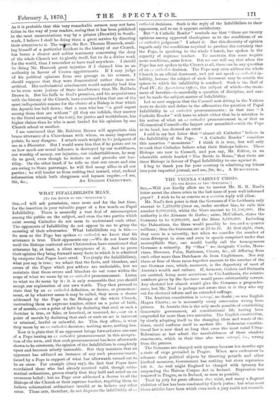WHAT INFALLIBILISTS MEAN.
[To THE EDITOR OF THE "SPECTATOR.") will ask permission, once more and for the last time, for the insertion in your valuable paper of a few words on Papal Infallibility. There is assuredly a vast deal of misconception among the public on the subject, and even the two parties which exist among Catholics do not seem to understand each other. The opponents of Infallibility do not appear to me to grasp the meaning of their adversaries. What Infallibilists say is this :- So soon as the Pope has spoken ex cathedra we know that his utterance is true. Their opponents say :—We do not know this until the Bishops scattered over Christendom have sanctioned that utterance by, at least, a silent acceptance of it. And to prove their opinion they bring forward many facts in which it is admitted by everyone that Popes have erred. Yes (reply the Infallibilists), what you say is true; we admit that the facts, and blunders, and errors of the Popes which you adduce are undeniable, but we maintain that these errors and blunders do not come within the scope of what we mean by an ex cathedra pronouncement. Listen to what we do mean by it ; it is only reasonable that you should accept our explanation of our own words. They then proceed to state that by an ex cathedra definition, or decree, or pronounce- ment, or by whatever name it may be called, they mean a decree addressed by the Pope to the Bishops of the whole Church, instructing them as supreme teacher, either on a point of faith, or of morals,--on a point of faith by declaring that such or such a doctrine is true, or false, or heretical, or unsound, &c.,—or on a point of morals by declaring that such or such an act is innocent or criminal, lawful or unlawful, &c. This, they affirm, is what they mean by an ex cathedra decision ; nothing more, nothing less.
Now it is plain that if an opponent brings forward even one case of a Pope issuing an ex cathedra pronouncement in this accepta- tion of the term, and that such pronouncement has been afterwards shown to be erroneous, the opinion of the Infallibilists is completely upset and becomes utterly untenable. But they maiutain that no opponent has adduced an instance of any such pronouncement, issued by a Pope in support of what has afterwards turned out to be an error. For example (they say), the fact that Popes have reordained those who had already received valid, though schis- matical ordinations, proves clearly that they held and acted on an erroneous belief ; but no Pope ever addressed a decree to all the Bishops of the Church as their supreme teacher, requiring them to believe schismatical ordinations invalid, or to believe any other error. These acts, therefore, do not disprove the infallibility of ex cathedra decisions. Such is the reply of the Infallibilists to their opponents, and to me it appears satisfactory.
But "A Catholic Reader" reminds me that "there are twenty opinions among approved theologians as to the conditions of an ex cathedra judgment." I admit it. But this diversity of opinion regards only the conditions required to produce the certainty that the Pope, in speaking to the whole Church, has spoken in the capacity of supreme teacher. To ascertain this some require more conditions, some fewer. But no one will say that when the Pope has not spoken to the Church at all, there can be any question of an ex cathedrei decision. The Pope may even address the whole Church in an official document, and yet not speak ex cathedra in- fallibly, because the subject of such document may be outside the sphere to which his infallibility is confined. Such is the Bull of Paul IV. Ex Apostolatas Officio, the subject of which—the treat- ment of heretics—is essentially a question of discipline, and can- not be made the subject-matter of Infallibility.
Let us now suppose that the Council now sitting in the Vatican were to decide and define in the affirmative the question of Papal Infallibility in ex cathedra pronouncements ; in that case "A Catholic Reader" will have to admit either that he is mistaken in his notion of what an ex cathedra pronouncement is, or that an (Ecumenical Council—the largest ever assembled—with the Pope at its head, has decreed an error.
I said in my last letter that "almost all Catholics" believe in the Infallibility of the Pope. "A Catholic Reader" considers this assertion " monstrous." I think it is true, but will only remark that Catholics believe what their Bishops believe. These Bishops are now in Council, and you say, Mr. Editor, in an admirable article headed "The Battle in Rome," that there are three Bishops in favour of Papal Infallibility to one against it.


































 Previous page
Previous page